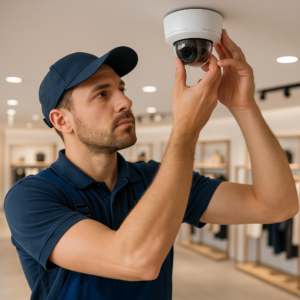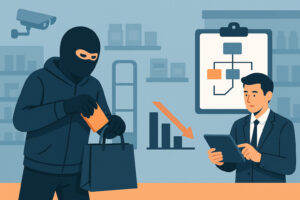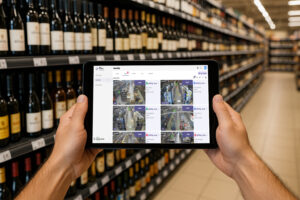Shrink: A Constant Challenge for Large-Scale Retail 🛒
Inventory shrink represents the difference between the theoretical inventory recorded in computer systems and the physical inventory actually present on the shelves. This performance indicator is crucial, as it directly impacts the profit margin of stores. While several factors can contribute to it, shoplifting remains the main cause, constituting a considerable and persistent financial loss for the entire retail sector.
To effectively combat this issue, the first fundamental step is to precisely identify the most frequently targeted products. This in-depth knowledge not only allows for the implementation of targeted prevention strategies to reduce losses, but also helps to optimize all in-store operations. By understanding the “hot spots,” it becomes possible to improve inventory management and deploy security personnel more judiciously and effectively.
Health and Hygiene Products: Small, Expensive, and Easy to Conceal 💄
Among the most coveted items, three categories stand out for their high added value and their small size, which greatly facilitates their concealment. The health and hygiene aisles are therefore particularly sensitive areas.
-
Cosmetics 💅
Lipsticks, mascaras, and foundations are prime targets due to their compact size and their high resale value .
-
Razor Blades 🪒
Refills from major brands, in particular, represent a significant cost for the consumer and are in high demand, making them a recurring target for thieves.
-
Batteries 🔋
Universal, essential, and relatively expensive, they are very easy to pocket without arousing suspicion.
The main challenge for these aisles lies in the difficulty of monitoring quick and discreet movements, often carried out in very busy aisles where staff attention is diluted.
Focus on Fresh Food Aisles: Meat and Cheese at the Top of the List 🥩
Although bulkier, some products from the fresh food aisles are also very vulnerable to theft due to their high price . Two product categories particularly stand out:
-
Meat 🍖
High-quality cuts of beef, such as filet, ribeye, or sirloin, are among the most stolen items. Their market value makes them a prime target.
-
Cheese 🧀
Specialty cheeses or pre-cut portions from large wheels also have a high value and are regularly stolen.
The theft techniques here are specific. “Ticket switching,” which consists of replacing the price tag of an expensive product with that of a cheaper item, is a common practice. The impact on the store is then twofold: the direct financial loss of the product and the increased complexity of inventory management for perishable goods .
Alcohol and Baby Products: Prime Targets with Diverse Motivations 🍼
Two other high-risk product categories illustrate the diversity of motivations behind shoplifting.
-
Alcohol and Spirits 🍾
Bottles of whiskey, vodka, or champagne are high-value items, often stolen for resale on parallel markets or for personal consumption. Their popularity makes them a constant target.
-
Infant Formula 🍼
Due to its high cost and essential nature, this item is unfortunately a frequent target, whether out of necessity or to supply a resale network.
Even when these products are equipped with traditional anti-theft devices, they are not foolproof. A complementary human and technological surveillance remains essential to effectively protect these sensitive aisles.
How AI Is Transforming the Fight Against Theft in Real Time 🤖
Faced with increasingly sophisticated theft tactics, intelligent video surveillance is emerging as a proactive and highly effective solution . Instead of simply recording images for after-the-fact reviews, modern systems analyze video streams in real time. Innovative solutions like Oxania leverage artificial intelligence to go a step further: they are capable of automatically detecting suspicious gestures , such as concealing a product in a bag, tearing packaging, or lingering abnormally long in an aisle.
The operational advantage is immense and transforms security into a preventive approach.
- ✅ Receive alerts in real time directly on a mobile device, allowing for immediate intervention.
- ✅ Enable preventive action , such as approaching a suspected customer to offer assistance—a customer service gesture that is often enough to deter.
- ✅ Shift from reactive security (confirming the loss) to a proactive strategy that protects margins and improves the environment for honest customers.





